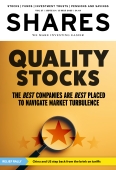Archived article
Please note that tax, investment, pension and ISA rules can change and the information and any views contained in this article may now be inaccurate.
Five steps to invest like Warren Buffett

At the tender age of 94, Warren Buffett has handed over the reins of Berkshire Hathaway (BRK.B:NYSE) to Greg Abel, who will take on the role of chief executive from next year. Buffett has run Berkshire for about as long as an average human lifespan and is as deeply welded into the company as a manager can get.
Thanks to his annual missives to Berkshire shareholders, Buffet has provided a treasure trove of investing advice available for free, which makes for an excellent guide for retail investors. Below are five investing principles laid out by Buffett which can help investors build their own mini-Berkshires.
1. STAY IN YOUR CIRCLE OF COMPETENCE
Warren says ‘You don’t have to be an expert on every company, or even many. You only have to be able to evaluate companies in your circle of competence. The size of that circle is not very important; knowing its boundaries, however, is vital.’
Staying inside your circle of competence is a really important piece of advice which can prevent you losing money and feeling a nasty sense of buyer’s remorse to boot. That’s not to say your circle of competence is static. It can expand as you build your investing knowledge and experience. But if you don’t understand something, then you shouldn’t invest in it. At the same time, it’s important to recognise that no-one has every single bit of data available about prospective investments, so a balance has to be struck in which investors gather enough information to know the conditions under which their investment is likely to perform well and poorly.
2. INVEST IN INEVITABLES
Warren says: ‘Obviously many companies in high-tech businesses or embryonic industries will grow much faster in percentage terms than will The Inevitables. But I would rather be certain of a good result than hopeful of a great one.’
Buffett also values companies which have predictable earnings streams and strong market leadership. They are few in number, and never a certainty, but consistency of earnings and market leadership are key tenets of the Buffett approach. Investors can apply this to their own portfolios by sticking to companies which are leaders in their field and have low risks to their earnings. Often this leads to stocks in the consumer staples sector like Coca-Cola (KO:NYSE), Unilever (ULVR) and Nestlé (NESN:SWX). You could make a case that Microsoft (MSFT:NASDAQ) and Apple (AAPL:NASDAQ) have become ‘inevitables’. A number of funds available to UK investors take a similar approach to the companies they’re buying, such as Fundsmith Equity (B41YBW7), Lindsell Train Global Equity (B3NS4D2), and Evenlode Global Income (BF1QMV6).
3. THINK LONG TERM
Warren says: ‘Our favourite holding period is forever.’
It’s totally uncontroversial that investors should be long term in their approach, and the idea that when you buy stocks or funds you should do so with the intention of never letting them go is a good one, not least because short-termism can lead to investment losses and excessive trading fees. However Buffett’s formulation of this principle is hyperbole intended to make the point, and Buffett himself has of course sold plenty of stocks in his lengthy and illustrious career. Private investors should also be willing to sell investments if there has been a fundamental shift in the prospects for the business, or indeed their own personal circumstances. Perhaps the words of the economist John Maynard Keynes may be a useful qualifier here; ‘when the facts change, I change my mind’.
4. BUY, AND HOLD
Warren says: ‘Inactivity strikes us as intelligent behaviour.’
Buffett is a big believer in selecting portfolio companies carefully and then leaving them to do their thing. Trying to trade in and out of companies and trends leaves you at the risk of eroding your returns through trading fees, mistakes, and spending time out of the market. A buy and hold approach will probably be the more rewarding strategy in the long run, and much less effort to boot. Inactivity should not be conflated with complacency though. Regular portfolio reviews should still be part of any active investor’s routine, at least once a year. Investors shouldn’t be afraid to switch out of holdings if the investment case has changed, or indeed if their own risk profile has shifted substantially.
5. BUY AN INDEX TRACKER
Warren says: ‘Both large and small investors should stick with low-cost index funds.’
Possibly the most jarring piece of advice to come from the most famous active money manager of all time is his insistence that retail investors should simply buy index trackers. Tracker funds certainly fit the bill for a large swathe of people who just want to invest for their future, but don’t have the time or inclination to figure out where to invest. But Buffet perhaps underestimates the propensity of many retail investors to make their own investing decisions.
There is a way to bridge the gap between total ignorance and the kind of expertise wielded by Buffett, a hinterland inhabited by most of us. By starting out with a core of tracker funds, and adding active funds and individual stocks as satellite holdings, investors can grow their circle of competence while also insulating their wealth from mistakes. Gradually they can grow the active part of their portfolio, if they wish. Building up this knowledge and experience will probably come in very handy as you approach retirement, when you will probably want to take a more active hand, dialling down risk and switching towards an income-producing portfolio. That will probably necessitate some investment selection decisions with a large pot of money, so it’s not a great idea to get stuck in without a warm-up.
Important information:
These articles are provided by Shares magazine which is published by AJ Bell Media, a part of AJ Bell. Shares is not written by AJ Bell.
Shares is provided for your general information and use and is not a personal recommendation to invest. It is not intended to be relied upon by you in making or not making any investment decisions. The investments referred to in these articles will not be suitable for all investors. If in doubt please seek appropriate independent financial advice.
Investors acting on the information in these articles do so at their own risk and AJ Bell Media and its staff do not accept liability for losses suffered by investors as a result of their investment decisions.
Issue contents
Education
Exchange-Traded Funds
Feature
Great Ideas
News
- Why shares in sofa seller DFS Furniture are springing back
- Raft of bad news sends Mobico shares 62% lower year-to-date
- UK consumer confidence falls as unemployment begins to rise
- Markets enjoy relief rally as China and US step back from brink of all-out trade war
- Pharma stocks face volatility on US plan to reduce drug prices
 magazine
magazine








